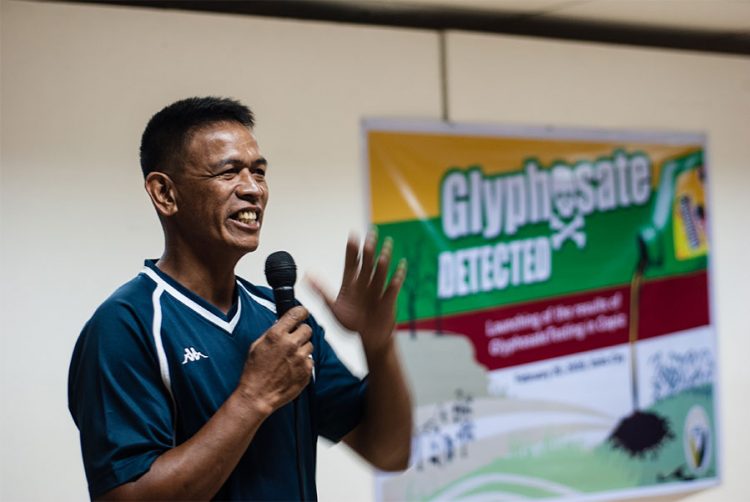Glyphosate, the world’s most widely used and controversial herbicide, was detected in soil, water and urine samples in a community growing genetically-modified corn in Central Philippines—igniting calls by local farmers for the Philippine government to help them shift away from GM farming.
In the village of Guinbialan, Maayon town, Capiz province, farmers have been using Monsanto’s Round Up Ready corn for the past 10 years. They were among the first to grow genetically-modified herbicide-resistant crops in the Philippines.
These small farmers used to grow indigenous corn varieties, rice, and vegetables. But after the Philippine government approved the commercialisation of RR corn, farmers have only been able to buy genetically-modified seeds from traders and usurers. Though they have been wanting to revert back to diversified farming, they lack support from the government and are indebted to traders and usurers who are tied to the trade of GM seeds. The farming community is growing concerned with the health and environmental effects of the use of Round Up (glyphosate). Glyphosate, the world’s most widely used herbicide, is classified by the International Agency for Research on Cancer as a “probable human carcinogen” and has been the subject of thousands of lawsuits in the US. It is listed as a Highly Hazardous Pesticide by Pesticide Action Network (PAN).
In response, farmer scientist group MASIPAG conducted the study to determine the presence and persistence of glyphosate in the community. Using the Abraxis Glyphosate strip test*, glyphosate was detected in all water and soil samples—these include the community’s water sources for drinking and washing clothes and dishes. Glyphosate was also detected among harvested and fresh corn kernel samples, as well as among urine samples of three farmers.
The Fertilizer and Pesticides Authority lists more than 70 glyphosate products marketed in the Philippines. The weedkiller is widely used among major crops such as rice, corn, and vegetables, and plantation crops such as sugarcane, palm oil, banana, pineapples, coffee, and rubber.
However, there hasn’t been government-led studies on the impacts of glyphosate use on communities. After the approval of RR corn, the Department of Agriculture has also not conducted any post-release monitoring to assess its impacts, among them the increased use of the cancer-causing herbicide.
In Guinbialan, villagers have reported 16 people who have been diagnosed with cancer since they started planting RR corn a decade ago. Of these, five people have already died.
“Glyphosate formulations has been found to induce DNA damage and has been associated with increased risk of cancer especially non-Hodgkin’s lymphoma, neurobehavioral disorders in children and birth defects and other diseases,” Dr. Romeo Quijano, toxicologist and chairperson of Pesticide Action Network Asia Pacific (PANAP), said in a forum in Iloilo City to announce the findings.

He added that glyphosate is among the pesticides targeted by PAN for global phase-out. The PAN monographs detail glyphosate’s adverse effects on humans, ecosystem functioning, pollination services, biological controls, soil fertility and crop health. “We strongly urge governments to ban glyphosate and adopt agroecological approaches to pest and weed management instead,” Dr. Quijano said. (See PANAP’s Alternatives to Synthetic Chemical Herbicides)
Environmental scientist Dr. Chito Medina of MASIPAG, meanwhile, warned about the persistence of glyphosate in the environment. Their study reveals that glyphosate is present in the environment for the entire cropping season. “Glyphosate presence can affect the soil ecosystem, such as microbial balance and the uptake of important nutrients needed by crops,” said Medina.
Filipino farmers and other advocates are calling on the Department of Agriculture to conduct a post-release monitoring and glyphosate-residue testing of RR corn, and for the Department of Health to study the effects of glyphosate on farming communities.
They also called on the Philippine government to encourage and provide production support for farmers who are shifting to non-GM corn farming, including providing non-GM corn seeds and promotion of diversified farming.
“The government should enact stringent liability and redress mechanisms to exact responsibility and accountability from the herbicide producers, including just compensation mechanism for the glyphosate-affected farmers and communities,” said Cristino Panerio, MASIPAG national coordinator.
*The Abraxis Glyphosate Strip Test, a rapid immunochormatographic strip test was used to detect glyphosate in water and food samples. According to its manufacturer, Abraxis, the strip test is used in qualitative screening of glyphosate with a detection range of 2.5 parts per billion (ppb) up to 100 ppb.








Discussion about this post